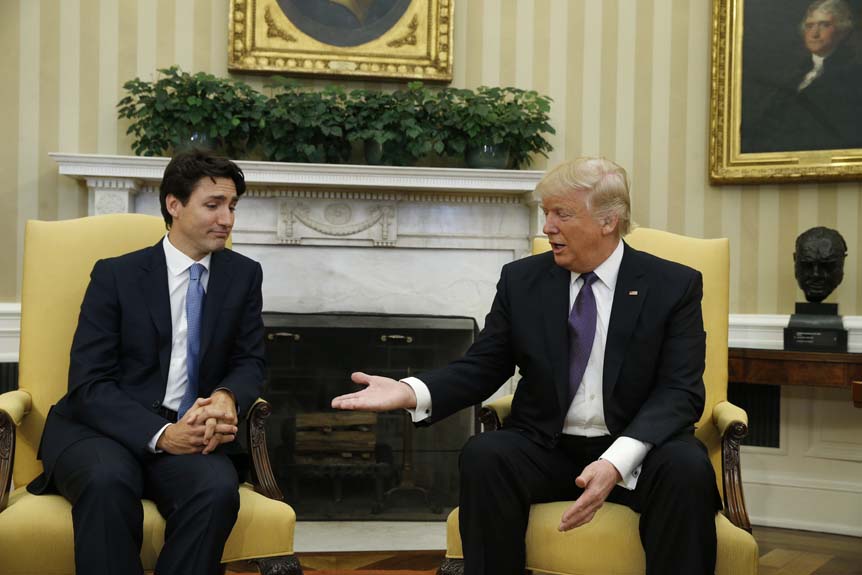Bill Morneau’s budget speech for two Canadas
As populists and globalists face off around the world, the Liberals don’t want to pick a side
Canadian Prime Minister Justin Trudeau (L) is greeted by U.S. President Donald Trump in the Oval Office at the White House in Washington, U.S., February 13, 2017. (Kevin Lamarque/Reuters)
Share

Donald Trump has changed how Liberals talk to Canadians. Justin Trudeau’s major speeches routinely side with the middle class, or whoever thinks they’re middle class, for the hard times that have befallen them as technology and globalization leave them behind—an attempted bulwark against any rise in the sort of anti-government populism that’s found life in the U.S. and across Europe. But even as he’s massaged his message, the Prime Minister constantly beats the drum of global cooperation that populists deeply resent. Finance Minister Bill Morneau’s second budget speech sharply reinforces that delicate rhetorical balancing act.
Last year, Morneau’s speech was relentlessly positive about sunny ways on the horizon for the middle class. That speech, delivered on the heels of an election win based on themes of hope and hard work, implored Canadians to march boldly into the future. Morneau’s opening line pledged to “restore hope,” and he promised that the country’s “best days lie ahead.”
When he did recognize pessimism among the people last year, Morneau offered tempered language: “Well,” he admitted, “Canadians are not so optimistic … That’s understandable.” He blamed a lack of confidence among the middle class largely on economic factors: the decline in oil prices, slowing economic growth, and stagnant wages. But Morneau pushed the country to embrace, not turn away from, disruptive forces in the form of an evolving global economy and transformative digital technology. “There will always be those who claim that we should fear change,” he said. “The reality is that we stand before a historic opportunity to shape and lead this change.”
A Brexit and Trump later, and Morneau has changed his tune. He started this year’s speech by empathizing with struggling families who fear change. He shifted the blame for that malaise away from broad economic trends, instead pointing the finger at broader societal trends. “Everyday folks who work hard to provide for their families are worried about the future,” Morneau lamented. “They’re worried that rapid technological change, the seemingly never-ending need for new skills, and growing demands on our time will mean that their kids won’t have the same opportunities that they had.”
“And who can blame them? For a decade, middle-class struggles were simply swept under the rug.”
That nod to troubled Canadians was straight out of Trump’s playbook (albeit worded more carefully). But then came the pivot. “The good news is that Canadians—on their own accord—worked hard and persevered. We have always been resilient and innovative, able to adapt—and prosper—in the face of change.” Cue a renewed appeal to the country’s hopeful side, one in which Morneau shouted out to a curated list of exciting future things.
“Mr. Speaker, as we look to the coming decades, we see the potential of new innovations to transform our lives. Self-driving cars, artificial intelligence, genomics, quantum computing, mobile payments, the sharing economy,” he said. “These ideas are changing our world for the better, just like the innovations that have preceded them.”
The Finance minister urged the pessimists to remember that, hey, this is all about them. “While the rapid pace of change can seem dizzying at times,” he said, “we must never lose sight of what’s driving these breakthrough innovations: people.” And then he name-checked a few recurring middle-class characters from his speech who have, indeed, embraced change: Mian, a taxi-driver with three kids who benefited from the Liberal child benefit; Dave, a plumber from British Columbia who took advantage of a retraining program; and Nebis, an Indigenous woman from a remote Algonquin community who used the child benefit to keep her three kids in hockey.
And there’s the formula Liberals hope will win over Canada’s heartland: show empathy, offer inspiration, promise prosperity.
A few minutes later, as Morneau sketched out his vision for Canada’s place in the world, his words borrowed nothing from Trump’s stump. “Mr. Speaker, we know that as a trading nation, our future depends on openness and investment. And that means never missing an opportunity to remind the world of what makes Canada a great place to live, play, and do business.” Later on: “As we prepare for the global economy of tomorrow, we will put our best foot forward, always looking to develop strategic partnerships to attract talent and investment.”
Trading. Openness. Partnerships. Morneau wedged in a celebration of free trade with Europe and, of course, a reminder that Canada and the United States enjoy “the most successful economic relationship in the world.” As Trump’s administration hints at NAFTA renegotiation and “fairer” deals with other trading partners, no one can accuse Morneau of isolationism.
Trudeau’s Liberals are having two conversations with their country at the same time, acknowledging that families were “swept under the rug” as the world changed around them in one breath, and embracing globalization and technological innovation in the next. What’s their motivation? Evidence shows signs of a strong populist strain in Canadian politics. Fellow democracies are picking sides between the populists and the globalists, and Canada’s turn is only a couple of years away. The Liberal budget made clear that the government won’t risk losing either side.